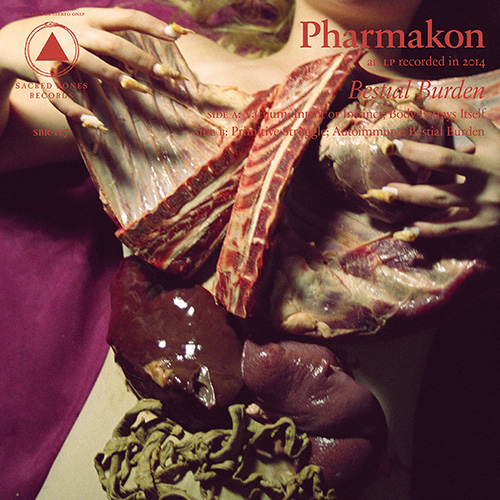On the cover of Bestial Burden, her second album as Pharmakon, the American noise musician Margaret Chardiet is shown with her body weighed down by various pieces of animal meat and offal. On one level this image is an arresting visual depiction of the album’s title, with Chardiet’s fingers clawing away at the ribs and flesh placed uncomfortably on top of her. On a deeper level, it sums up the album’s themes of pity, terror and abjection. The image of an animal’s carcass and innards lying on the body refers directly to the work of the Austrian performance artist and painter Hermann Nitsch, the last remaining active member of the Viennese Actionist movement. Many of Nitsch’s actions incorporate the ritual evisceration of cows, pigs and lambs, followed by the laying on and covering of the naked human body with the bloody parts of the disembowelled animal. As Nitsch wrote: "Flesh, viewed as a living body, reveals itself as a Rubenesque opulent vitality; if dissected, it shows itself to be raw meat, as exposed organ, the prey of man the predator."
Margaret Chardiet did, in fact, experience a kind of dissection prior to the making of this record. Shortly before embarking on a European tour, she underwent major surgery for a medical emergency, leading to the removal of an internal organ. Bestial Burden was largely written in the aftermath of this experience, and as a result there’s a sense of the body as something exposed, fragile and vulnerable running through the record’s six tracks. The music is consistently shocking, even upsetting, as Chardiet finds herself in the kind of deeply personal territory that is not often explored in music, and certainly not in noise music, with its tendency to often assert ideas of aggression and self-belief. It’s a short album, only 30 minutes or so, but every one of those minutes seethes with pathological disquiet.
Explorations of psychological trauma in art and music are fairly commonplace; what makes Pharmakon special is that she extends that trauma deep into the physical realm, carrying with it notions of injury and ritual self-abasement. In the early 1980s Swans and Einstürzende Neubauten broke new ground in their obsession with the body as a site of painful affliction, and traces of both can certainly be found in the grinding, reverberant noise that stalks Bestial Burden. Yet the album easily transcends its influences, forming a bleak, distressing narrative of a self on the brink of collapse.
The brief, stricken opener, ‘Vacuum’, sets the tone of panicked anxiety that infects the whole record. Chardiet hyperventilates desperately, fighting for breath as nasty, buzzing drones hover menacingly overhead. Adding to the sense of claustrophobic unease, Chardiet’s frantic gasps are multitracked. It’s an example of the recording techniques employed by producer Sean Ragon, who also packed people into the studio for some of the vocals in order to enhance the live-sounding aspect of the recording. As a result, Chardiet’s voice is powerfully immediate, not so much in your face as trapped inside your skull.
As the record unfolds, it becomes a compelling drama in which lurching bass thuds, diseased drones and shards of metallic rhythm converge evilly on Chardiet’s traumatised body and mind. In self-defence or retaliation, Chardiet responds with nightmarish screams and fragmented, half-buried texts. Track titles like ‘Body Betrays Itself’, ‘Autoimmune’ and ‘Primitive Struggle’ bear witness to the physical and psychological damage inflicted by Chardiet’s surgery. The deranged shriek that comes three minutes into ‘Intent or Instinct’ is a genuinely terrifying moment, its corrosive impact recalling the demonic invocations of former Swans singer Jarboe. Elsewhere, ‘Primitive Struggle’ is the soundtrack to a body turning itself inside out, its ominous beats giving no trace of comfort to Chardiet’s convulsive retching and coughing.
It’s only on the closing title track that Bestial Burden approaches any kind of positive resolution. Despite the needling frequencies that loom over the piece, echoing early Whitehouse, the mood is strangely euphoric, with incantatory vocals and cackling laughter testifying to Chardiet’s survival. Yet it’s hard to view this conclusion as anything other than a pyrrhic victory, given the harrowing nature of what has gone before. Acknowledging her sickness as an unfathomably tragic ordeal, Pharmakon can only defend herself by means of resistance and negation.
<div class="fb-comments" data-href="http://thequietus.com/articles/16474-pharmakon-bestial-burden-review” data-width="550">


